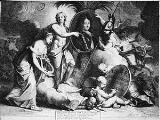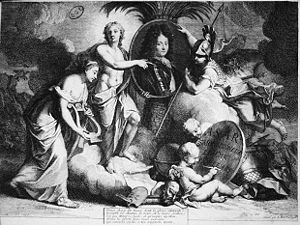
Jean-Baptiste Stuck
Encyclopedia
Jean-Baptiste Stuck or "Batistin" (6 May 16808 December 1755) was an Italian-French composer and cellist of the Baroque
.
Little is known of Stuck's early years. He was born at Livorno
, came from a merchant family, and was the son of Giovanni-Giacomo Stuck and Barbera Hellerbeck. From 1702 he was in the service of Countess Lemos in Naples
. Stuck wrote aria
s for the performance of the opera L'innocente inganno of Tomaso Albinoni
, which was performed under the new title Rodrigo in Algieri on December 10, 1702 in Naples at the Theatre San Bartolimeo.
Shortly thereafter Stuck moved to Paris. In 1705, he published the collection Für das Jahr 1701 through the Ballard publishing house. In Paris, he was a member of the Chapelle royale
and a cellist in the service of the Philippe II, Duke of Orléans
. In 1722, he led the cello in the opera orchestra, displacing the bass viol
. In 1733 he received French citizenship. He died in Paris.

and about 15 opera-ballets for Versailles
.
s, in 1706, 1708, 1711, and 1714. In 1729, the Concert Spirituel
performed another cantata Union de la musique française et italienne.
Baroque music
Baroque music describes a style of Western Classical music approximately extending from 1600 to 1760. This era follows the Renaissance and was followed in turn by the Classical era...
.
Little is known of Stuck's early years. He was born at Livorno
Livorno
Livorno , traditionally Leghorn , is a port city on the Tyrrhenian Sea on the western edge of Tuscany, Italy. It is the capital of the Province of Livorno, having a population of approximately 160,000 residents in 2009.- History :...
, came from a merchant family, and was the son of Giovanni-Giacomo Stuck and Barbera Hellerbeck. From 1702 he was in the service of Countess Lemos in Naples
Naples
Naples is a city in Southern Italy, situated on the country's west coast by the Gulf of Naples. Lying between two notable volcanic regions, Mount Vesuvius and the Phlegraean Fields, it is the capital of the region of Campania and of the province of Naples...
. Stuck wrote aria
Aria
An aria in music was originally any expressive melody, usually, but not always, performed by a singer. The term is now used almost exclusively to describe a self-contained piece for one voice usually with orchestral accompaniment...
s for the performance of the opera L'innocente inganno of Tomaso Albinoni
Tomaso Albinoni
Tomaso Giovanni Albinoni was an Italian Baroque composer. While famous in his day as an opera composer, he is mainly remembered today for his instrumental music, such as the concertos, some of which are regularly recorded.-Biography:Born in Venice, Republic of Venice, to Antonio Albinoni, a...
, which was performed under the new title Rodrigo in Algieri on December 10, 1702 in Naples at the Theatre San Bartolimeo.
Shortly thereafter Stuck moved to Paris. In 1705, he published the collection Für das Jahr 1701 through the Ballard publishing house. In Paris, he was a member of the Chapelle royale
Chapelle royale
The chapelle royale was the musical establishment attached to the royal chapel of the French kings. The term may also be applied to the chapel buildings, the Chapelle royale de Versailles....
and a cellist in the service of the Philippe II, Duke of Orléans
Philippe II, Duke of Orléans
Philippe d'Orléans was a member of the royal family of France and served as Regent of the Kingdom from 1715 to 1723. Born at his father's palace at Saint-Cloud, he was known from birth under the title of Duke of Chartres...
. In 1722, he led the cello in the opera orchestra, displacing the bass viol
Viol
The viol is any one of a family of bowed, fretted and stringed musical instruments developed in the mid-late 15th century and used primarily in the Renaissance and Baroque periods. The family is related to and descends primarily from the Renaissance vihuela, a plucked instrument that preceded the...
. In 1733 he received French citizenship. He died in Paris.

Operas
He composed numerous operas- Méléagre (1709)
- Manto la fée (1711)
- Il Gran Cid (Livorno 1715, Naples 1717)
- Polydore (Paris 1730)
and about 15 opera-ballets for Versailles
Versailles
Versailles , a city renowned for its château, the Palace of Versailles, was the de facto capital of the kingdom of France for over a century, from 1682 to 1789. It is now a wealthy suburb of Paris and remains an important administrative and judicial centre...
.
Secular Cantatas
Stuck published four books of cantataCantata
A cantata is a vocal composition with an instrumental accompaniment, typically in several movements, often involving a choir....
s, in 1706, 1708, 1711, and 1714. In 1729, the Concert Spirituel
Concert Spirituel
The Concert Spirituel was one of the first public concert series in existence. The concerts began in Paris in 1725 and ended in 1790; later, concerts or series of concerts of the same name occurred in Paris, Vienna, London and elsewhere...
performed another cantata Union de la musique française et italienne.
- 1706: Philomele. L'amant impatient. L'amant reconcilie. Contre l'ambition. Le calme de la nuit. L'Aurore et Cephale.
- 1708: Sur la prise de Lérida
- 1711:
- 1714: Héraclite et Démocrite

